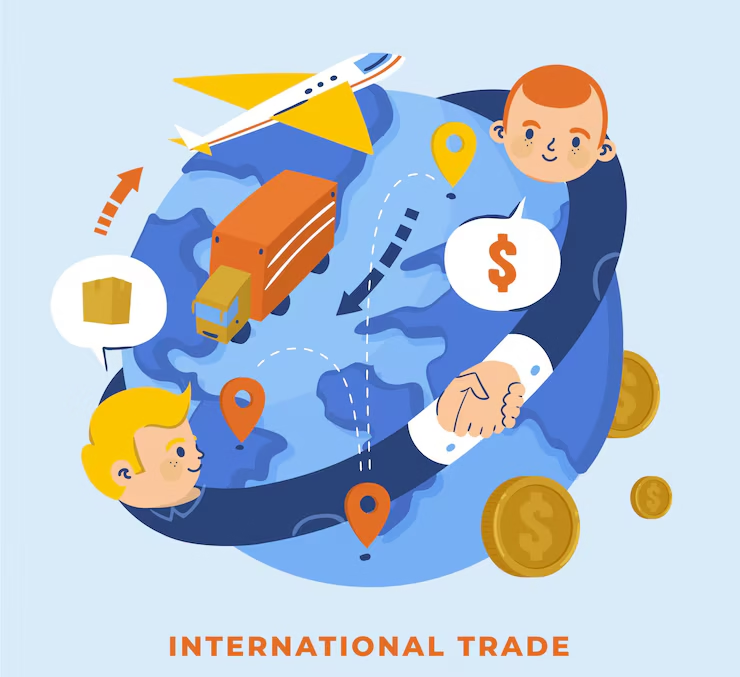International trading is nothing but trading between two different countries. It is one of the most important factors in raising the standard of living, creating employment and providing consumers with various goods and services that are not easily accessible in their home countries.
International trade has been there for generations, but in the past few decades, international trade has become increasingly important in increasing the GDP of a nation. A large part of our country’s GDP depends on its imports and exports. Let us now understand what international trade theory is.
What's the International Trade Theory
The proposition of international trade simply explains how international trade works in different ways. Trading is the exchange of goods or services between two or more parties. The purpose of trading is for people to profit from the business. The goods or services may be demanded or wanted by them. International trade is the cross-border exchange of goods and services. Over time, several regulations have been developed to cover domestic dealers and the trade itself. The international trade proposition is dominated by how countries use their resources efficiently.
Export and Import
Products vended on the global request are called exports, and products bought on the global request are called imports. The imports and exports are recorded in the current account section of the country’s balance of payments.
Global trade allows developed countries to use their resources like labour, technology, and capital more efficiently. Different countries are endowed with different means and natural resources, similar as land, labour, capital, and technology.
The efficient use of resources allows countries to produce some goods more efficiently and at a lower cost. However, if a country cannot produce an item efficiently, it can be obtained through trade with other countries. This is known as international trade specialization.
How International Trade Works?
International trade is carried out along incredibly intricate supply chains that connect the countries which supply the raw materials, the manufacturing countries that make and process those materials, and the consumer countries that use the finished goods.
An import is a product that is purchased from the global market, whereas an export is a product that is sold to the global market. The network of supply routes, suppliers, processors, and consumers behaves like a living thing when trade is allowed to flourish. The chain will be affected when any one link changes, such as when an iron ore miner declares bankruptcy or when the price of the metal suddenly rises.
Numerous stimuli have the potential to cause change. The most frequent ones include shifting consumer demand for products, technological advancements, and new methods of transporting goods around the world.
Why do we need international trade laws?
In cross-border transactions, two or more entities trade internationally with each other beyond the territorial limits of a country or transact in a domestic trade where one or more of the parties is located outside the country of the transaction. Here are some of the reasons why countries need international trade laws:
- For financing cross-border transactions
A cross-border financial arrangement is one that crosses national boundaries. The terms of this agreement include loans, letters of credit, banker’s acceptances, bank guarantees, depository receipts, etc. that require international trade laws.
Buying or selling products or services
It involves buying and selling goods and services. We need international trade laws for production and sales that take place outside the jurisdictional borders of a country.
Combined research/shared services etc.
Increasingly, businesses are utilizing shared services. To accomplish this, joint research programs are being established as an industry cartel or chamber of commerce. As these shared service centers provide services across borders, they are concerned with international trade if they are located in different parts of the world.
Why is it important?
International trade theory explains and promotes international trade. A wrong or unwise view of international trade can seriously affect a country’s long-term financial stability.
For example, various international trade theories compete over the idea that: Can countries ban products from other countries – through slavery or child labour? A trading theory focusing solely on financial ratios and statistics favours such businesses. Another trade theory would argue that the long-term effects of child labour would cause more harm to both countries involved in the trade. A third trade theory argues that trade based on slavery and child labour is inherently neither good nor bad for traders. Rather, it depends.
International trade theory is a very controversial and powerful theory, so it is important to study it well. Policymakers should be familiar with all possible theories and apply the most appropriate ones to their country’s specific circumstances.
Benefits of International trade
Let us now understand some of the benefits of international trade laws:
It creates job opportunities
International trade has the primary benefit of creating a wide range of job opportunities. Through international trade, new industries are developed to meet product demands in different countries, resulting in more jobs. Countries will certainly be able to reduce unemployment rates under this condition. Therefore, it will be easier for someone who does not have a job to find one.
Leads to the prosperity of a country
Each country’s income is also increased by international trade. In other words, the goods they need can be sold and obtained by countries that have advantages and disadvantages of an item. It is through international trade activities that needs will be met, and income will be increased. As a result, a country’s income will increase due to its prosperity.
- The needs of life are easier to fulfill
International trade will also aid countries in meeting their needs if those needs are not produced in their home country. Having a wealth of natural resources is a necessity for every country. First, we must consider the geographical conditions, the climate, the level of skill and knowledge in science and technology, and so on. In the future, countries can produce their own products.
- Expanding markets and increasing income
In addition to expanding the market for the company, international trade has other benefits. As a result, overproduction and falling sales prices are avoided by producing optimally. Exporting excess products abroad is possible thanks to international trade, which allows entrepreneurs to run their production machines to the maximum. As a result, income will rise due to high productivity.
- Make good relations between countries
The establishment of positive relations between countries is another benefit of international trade. There is no doubt that positive relations will be established between the participating countries. After that, the country can engage in other forms of cooperation as well.
Wrap Up
Globalization has increased the interdependence of the world economy, and international trade is an important part of most economies. It provides consumers with a variety of choices and increases competition, forcing companies to produce cost-effective, high-quality goods that benefit these consumers.




